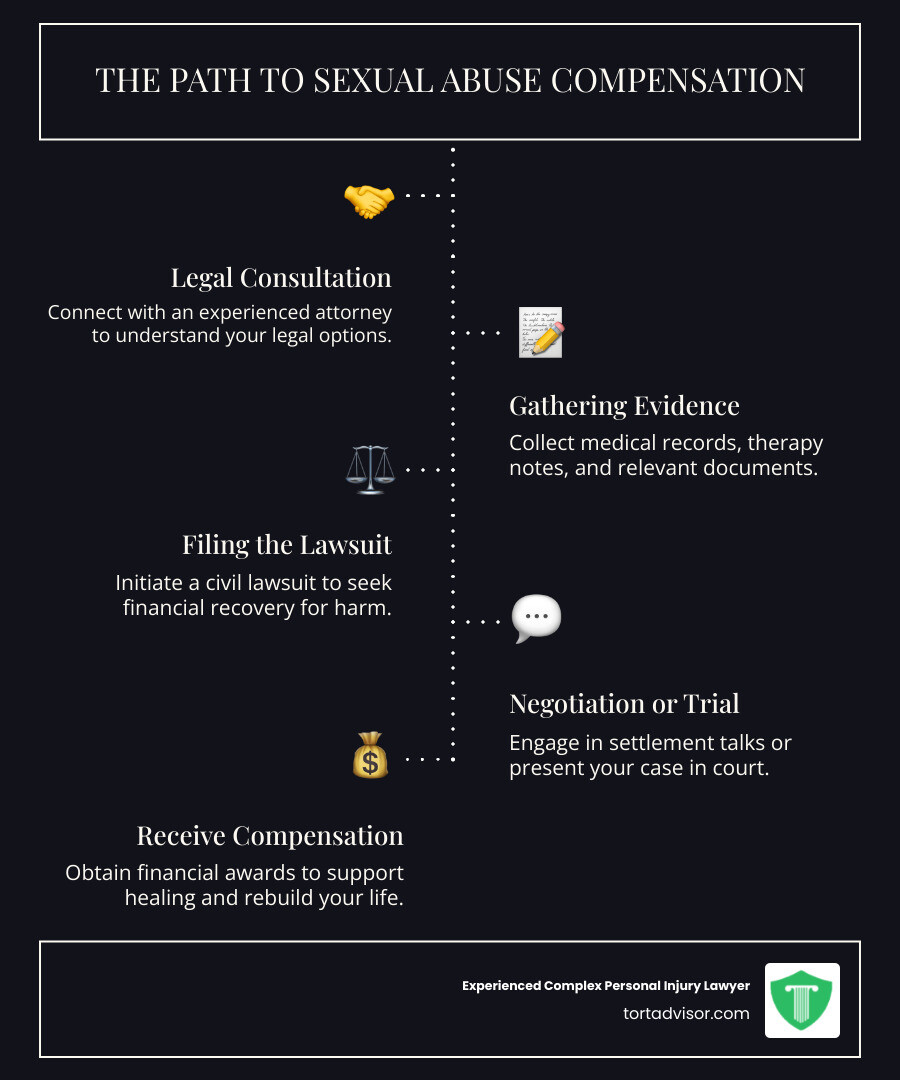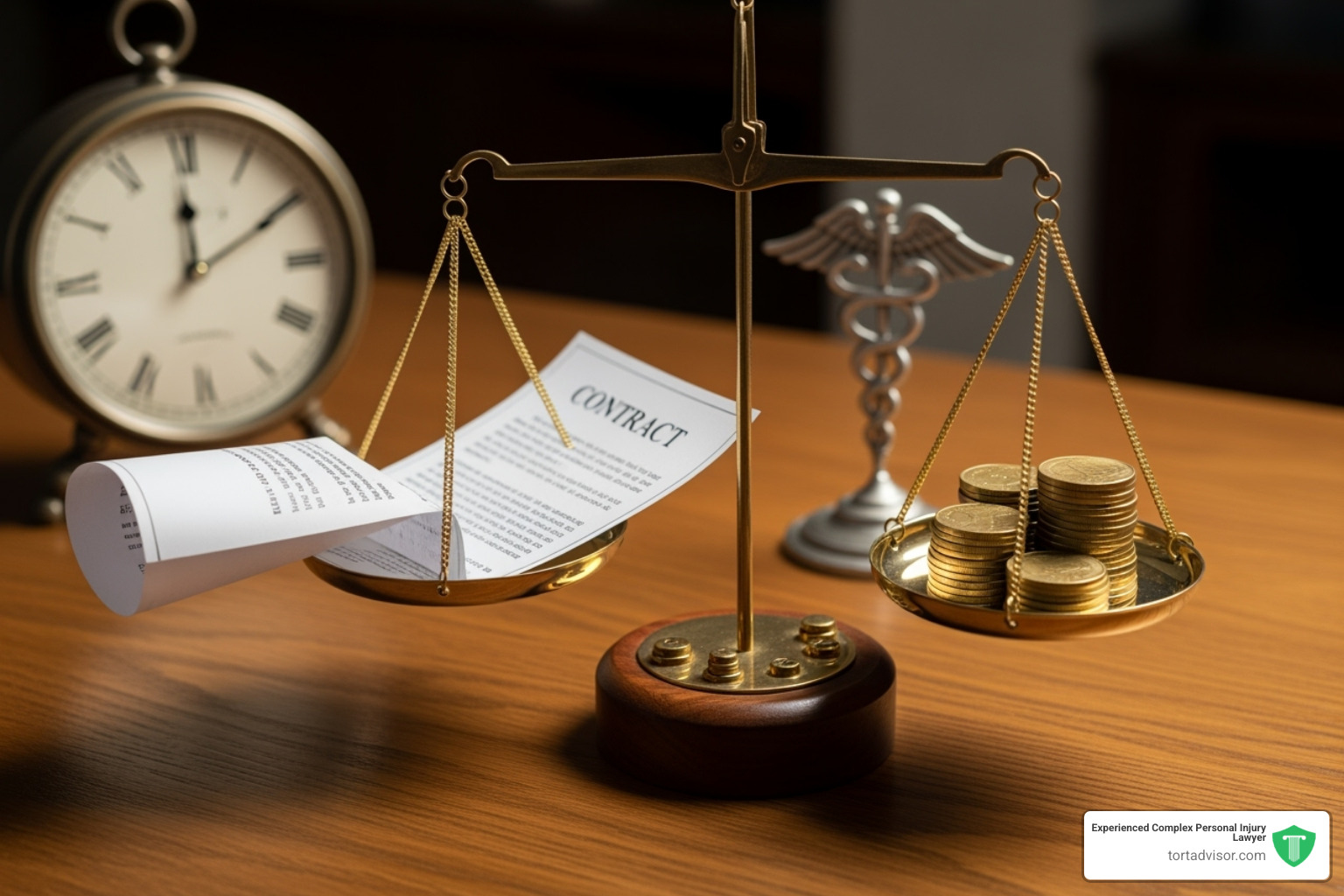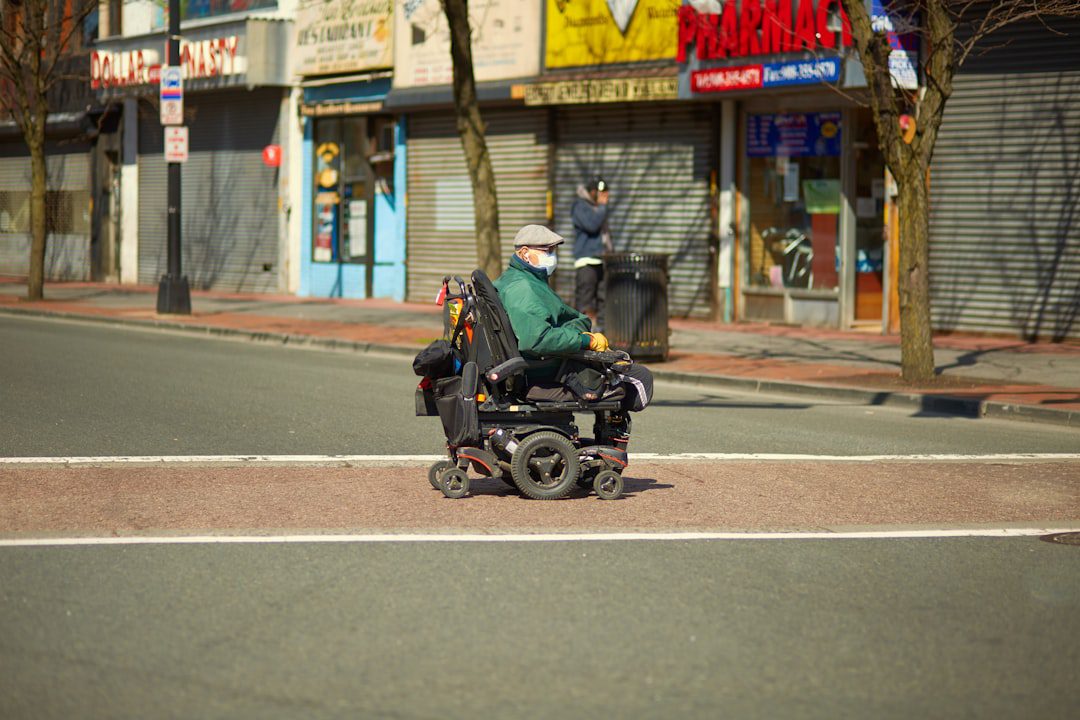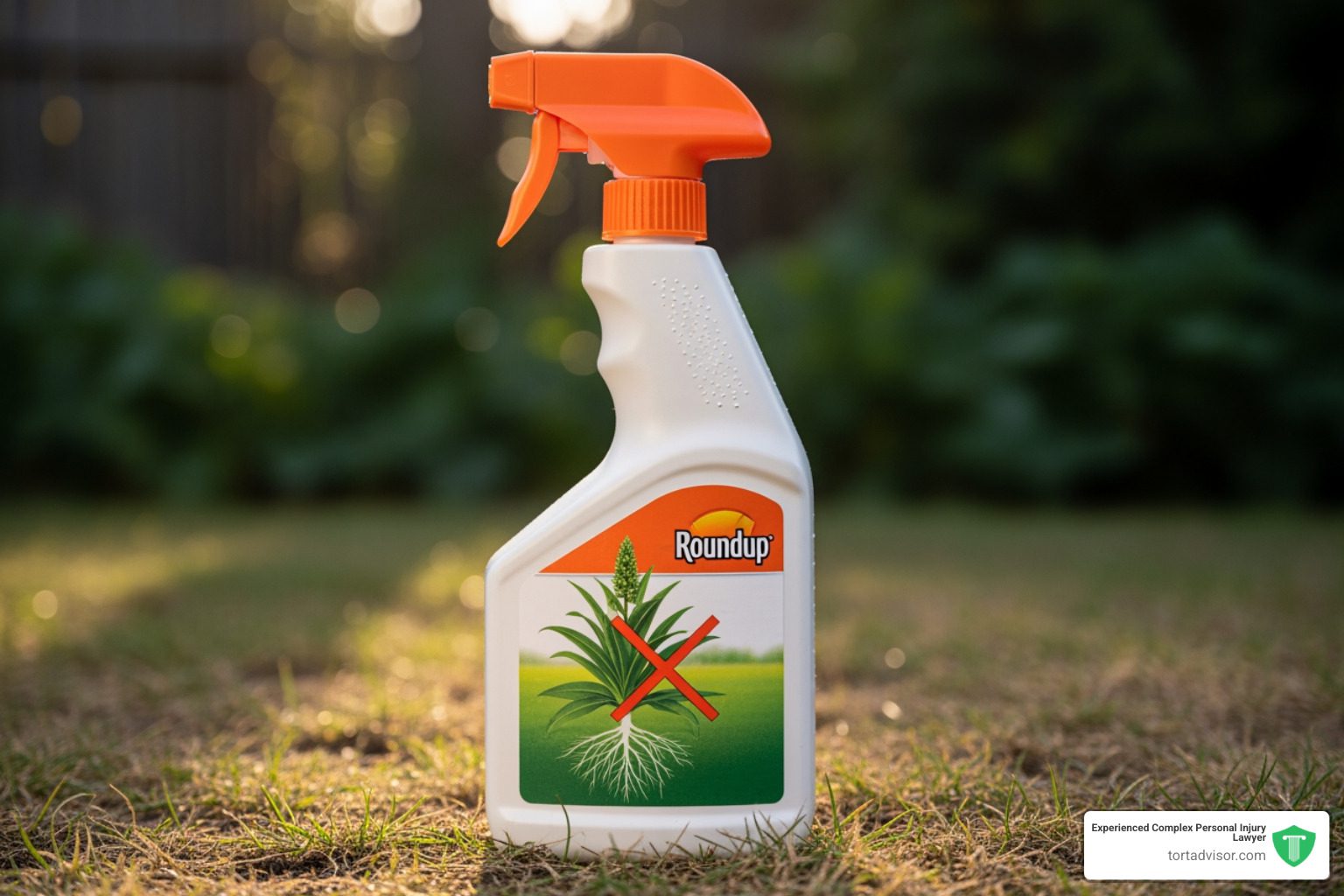


Understanding Your Path to Sexual Abuse Compensation
Sexual abuse compensation provides financial recovery for survivors through civil lawsuits, addressing the costs and long-term impacts of abuse. Unlike criminal cases focused on punishment, civil compensation helps survivors rebuild their lives.
Key Types of Sexual Abuse Compensation:
- Economic Damages – Medical bills, therapy costs, lost wages, and reduced earning capacity
- Non-Economic Damages – Pain and suffering, emotional distress, PTSD, and loss of life enjoyment
- Punitive Damages – Additional awards to punish egregious conduct and deter future abuse
- Settlement Ranges – Most cases settle between $250,000 and $1,000,000, with severe cases exceeding $1 million
Who Can Be Held Liable:
- Individual abusers
- Institutions (schools, churches, youth organizations)
- Employers who failed to prevent known abuse
- Organizations with inadequate supervision or background checks
The legal process is a civil lawsuit, separate from any criminal proceedings. Civil cases have a lower burden of proof – requiring only that abuse occurred “more likely than not” rather than “beyond a reasonable doubt.”
Major settlements show the potential compensation. The Boy Scouts of America established a $7 billion fund for survivors, while Los Angeles County agreed to a $4 billion settlement for juvenile detention abuse cases.
Time limits vary by state, but many have extended or eliminated statutes of limitations for childhood sexual abuse cases, sometimes creating “revival windows” for previously time-barred cases.
I’m Mason Arnao. I connect survivors with experienced legal representation and have seen how sexual abuse compensation provides financial resources and a sense of justice. My goal is to help you understand your options and find the right attorney to pursue the compensation you deserve.
Understanding the Types of Damages in a Lawsuit
When survivors pursue sexual abuse compensation in a civil lawsuit, they seek financial recovery for their harm. Unlike criminal cases that punish the perpetrator, civil law aims to compensate survivors for their losses.
We categorize these losses into compensatory damages (economic and non-economic) and punitive damages. Understanding these is crucial for grasping what you can seek in a lawsuit.
Civil lawsuits have a lower burden of proof than criminal cases (“more likely than not” vs. “beyond a reasonable doubt”). This means a civil case can succeed even if criminal charges were never filed or resulted in an acquittal.
For a comprehensive overview, explore our guide: What kind of compensation could victims receive?.
How Economic Damages Are Calculated in Sexual Abuse Cases
Economic damages (special damages) compensate for quantifiable financial losses from the abuse. These are easier to calculate as they come with bills or wage statements.
Components of economic damages include:
- Medical Expenses: Covers costs for physical injuries, including doctor visits, medication, surgery, and physical therapy.
- Therapy Costs: Covers necessary mental health treatment like psychiatric care, counseling, and psychotherapy, both past and future.
- Lost Wages and Reduced Earning Capacity: Abuse can impact a survivor’s ability to work and earn income. Childhood trauma can affect career trajectory, leading to missed opportunities or unemployment. We work with employment experts to project these future lost earnings.
- Rehabilitation Costs: Covers specialized programs for issues like addiction resulting from the abuse.
- Other Out-of-Pocket Expenses: Includes other direct costs like travel for therapy, relocation for safety, or educational expenses if schooling was disrupted.
For example, a survivor might be awarded $75,000 for economic damages. We gather all financial documents to account for every tangible loss.
What Constitutes Non-Economic Damages in Sexual Abuse Claims
Non-economic damages (general damages) compensate for intangible, devastating losses that are harder to value but acknowledge the profound emotional toll.
Key components include:
- Pain and Suffering: The physical pain and ongoing emotional anguish from the abuse.
- Emotional Distress: The psychological impact, including fear, humiliation, shame, and anger.
- Mental Anguish: Severe suffering manifesting as nightmares, flashbacks, and intrusive thoughts.
- Loss of Enjoyment of Life: The diminished ability to enjoy daily activities, hobbies, and relationships.
- Psychological Trauma: Includes diagnoses like PTSD, anxiety, and depression. The landmark Adverse Experiences in Childhood Study (ACES) links childhood trauma like sexual abuse to long-term mental and physical health problems, including chronic diseases.
Pain and suffering often comprise the largest part of a settlement. While no amount of money can erase the trauma, it provides resources for healing. For instance, a survivor might receive $150,000 for non-economic damages. We work with mental health experts to quantify this impact.
The Role of Punitive and Statutory Damages
Beyond compensation, the legal system can punish egregious behavior and deter future misconduct.
Punitive Damages: These are awarded to punish the abuser or institution for malicious or reckless conduct, not to compensate the survivor. They are reserved for shocking cases and serve as a deterrent. For example, a Missouri court affirmed a $177 million verdict ($149 million punitive) against Hyatt Corp. for a sexual assault by a security guard. Learn more about Punitive damages.
Statutory Damages: Some states have laws providing fixed damage amounts for certain abuse cases, like those involving children. These ensure a minimum compensation level, even if losses are hard to quantify. We investigate their availability in every case.
Here’s a table comparing criminal restitution and civil compensation for sexual abuse:
| Feature | Criminal Restitution | Civil Compensation |
|---|---|---|
| Purpose | Part of criminal punishment for offender | Financial recovery for survivor; holding abuser/institution accountable |
| Initiated by | State prosecutor | Survivor (or their legal representative) |
| Awarded by | Criminal court as part of sentencing | Civil court verdict or settlement |
| Focus | Out-of-pocket costs (e.g., medical bills) | Economic, non-economic, and punitive damages (broader scope) |
| Burden of Proof | Beyond a reasonable doubt | Preponderance of the evidence (more likely than not) |
| Examples Covered | Hospital bills, lost wages directly from crime | Therapy costs, pain and suffering, lost income, punitive awards |
| Impact on Survivor | May offer some financial relief; part of justice | Aims to make survivor “whole”; can include long-term healing costs |
| Taxability | Generally not taxable (as part of criminal sentence) | Varies (see section on taxability) |
Key Factors That Influence Sexual Abuse Compensation Amounts
Survivors often ask about potential sexual abuse compensation, but there’s no simple answer. Every case is unique, with multiple factors determining its value. Settlements can range from hundreds of thousands to millions of dollars, depending on specific details. Understanding these factors helps build the strongest case.
Severity, Duration, and Nature of the Abuse
The details of the abuse significantly impact compensation. Courts consider the frequency of abuse; longer patterns of abuse generally lead to higher awards due to deeper psychological damage.
The type of abuse also matters. Physical violence, threats, degrading acts, use of force or weapons, or recording the abuse are seen as especially harmful and can increase compensation.
The abuser’s conduct is key. Egregious behavior, like the repeated aggressive assaults that led to a $900 million verdict, results in higher damages. Using a position of power to manipulate or coerce victims also increases case value.
The Victim’s Age and Relationship to the Abuser
The victim’s age is crucial. Child victims often receive higher awards because abuse during developmental years can alter their entire life. The law recognizes children’s vulnerability and the lasting effects of childhood trauma.
The relationship to the abuser is also key. A betrayal of trust by someone in authority—like a family member, teacher, coach, or clergy—is viewed as especially harmful and often leads to higher compensation due to the power imbalance.
If your case involves a teacher, you might find our detailed guide helpful: More info about teacher sexual abuse lawsuits. These cases often involve unique factors related to the educational setting and institutional responsibility.
Long-Term Psychological and Emotional Impact
The lasting mental health impact is a major factor in sexual abuse compensation. The psychological wounds can last a lifetime, and courts recognize this.
Documented trauma, through medical records and therapy notes, establishes the scope of suffering. Diagnoses like PTSD, anxiety, or depression provide concrete evidence of the abuse’s impact.
The landmark Adverse Experiences in Childhood Study (ACES) shows that childhood trauma like sexual abuse leads to lifelong health problems. This helps courts understand the need for compensation covering long-term treatment and reduced quality of life.
Expert testimony from psychologists is crucial. They can explain to a jury how trauma has affected your ability to work, form relationships, and enjoy life.
If you’re looking for legal representation that understands these complex psychological factors, our network includes attorneys who specialize in this area: More info about abuse victim lawyers.
Institutional Liability and Sources of Funds
Often, the most important factor is the institution that enabled the abuser. Schools, churches, or other organizations can be held financially responsible for failing to protect you. These institutions usually have more resources than individual abusers.
Employer negligence includes failing to conduct background checks, ignoring warning signs, or inadequate supervision. Courts hold institutions accountable for creating environments where abuse can occur.
The Boy Scouts of America case provides a powerful example. Boy Scouts of America established a $7 billion fund for survivors after decades of failing to protect children.
Compensation sources include the abuser’s assets, institutional funds, insurance policies, and victim compensation funds. Insurance coverage is often a key factor.
Religious institutions present unique challenges, often involving complex legal questions and historical cover-ups. Our guide covers these specific issues: More info about church sexual abuse lawsuits.
Institutional cases often result in higher compensation due to greater resources and liability for failing to protect victims. When an institution knowingly ignored abuse or moved abusers, courts see this as egregious conduct deserving substantial compensation.
The Legal Path to Justice: Filing Your Claim
Pursuing sexual abuse compensation can feel overwhelming, but you are not alone. Understanding the legal path can empower you. Most claims follow similar stages: an initial consultation with a specialized attorney, followed by investigation, evidence gathering, and then either settlement negotiations or a trial.
The timeline for a case varies from a few months for straightforward claims to several years for complex cases involving institutions. Your attorney can provide a more specific timeline. Our guide explains the initial steps: What’s the first step to filing a claim?.
The Importance of Filing Promptly and Statutes of Limitations
Statutes of limitations, or time limits for filing lawsuits, are critical. These deadlines vary by state and depend on your age at the time of abuse and when you connected your injuries to the abuse.
Fortunately, many states have extended these deadlines to give survivors more time. Extended statutes of limitations and revival windows now allow many to file claims that were previously time-barred.
The findy rule in some states means the clock doesn’t start until you realize your injuries stem from the abuse, which can be years later.
Landmark legislation like various Child Victims Acts has removed time limits entirely in some states. For example, North Carolina law allowing suits despite expired statutes demonstrates how states are prioritizing survivor access to justice.
Even if you think too much time has passed, speak with an attorney. New laws and exceptions may apply to your case.
Gathering and Preserving Evidence for Your Claim
A strong case requires careful documentation of the abuse and its impact. While challenging, this evidence is crucial. Key evidence includes:
- Medical and mental health records documenting injuries and trauma diagnoses like PTSD.
- Witness testimony from anyone who saw the abuse or its effects.
- Personal journals, diaries, emails, texts, or social media posts that document the abuse or your suffering.
- Police reports and other official investigation documents.
- DNA evidence or other forensic proof.
- Employment records showing the impact on your career.
Preserve everything relevant; your attorney will determine what is most valuable. Your legal team will handle this sensitive process with the respect you deserve.
How an Experienced Attorney Can Maximize Your Sexual Abuse Compensation
Maximizing your compensation requires an attorney who understands trauma, can calculate your full damages, and knows how to hold institutions accountable.
An experienced attorney will identify all potential compensation sources, including negligent institutions. They will assess all economic and non-economic damages.
Strong negotiation skills are crucial, as most cases settle out of court. A good attorney knows your case’s true value and will fight for a fair settlement.
If the case goes to trial, you need an attorney with trial experience who can work with expert witnesses to compellingly present your case to a jury.
The right attorney will use a trauma-informed approach, protecting your privacy while fighting for your rights. Fair compensation provides resources for healing and holds wrongdoers accountable.
At Tort Advisor, we connect survivors with attorneys who specialize in these complex cases. Our Finding the Best Injury Lawyer Guide can help you understand what to look for, while What can a Personal Injury Lawyer do for you? explains the full scope of legal support available.
Frequently Asked Questions about Sexual Abuse Compensation
How much money can you get from a sexual abuse lawsuit?
Survivors often ask about potential compensation. While every case is unique, real-world examples can illustrate the possibilities.
Most settlements range from $250,000 to $1,000,000, but cases with severe trauma or institutional negligence can exceed $1 million. The amount depends on factors like abuse severity and its long-term impact.
High-profile examples show the range. Santa Monica settled for $122.5 million with 124 survivors of a city employee (nearly $1M each). A Georgia jury awarded $40 million to a teen sex trafficking victim.
Major institutional settlements include L.A. County’s $4 billion agreement for juvenile detention abuse and the Boy Scouts of America’s $7 billion fund for tens of thousands of survivors.
Individual verdicts can also be substantial. A Missouri court affirmed a $177 million verdict against Hyatt Corp. for an assault by a security guard. Billionaire Alkiviades David was ordered to pay $900 million for sexual assault.
Average settlements against religious institutions range from $375,000 to $700,000, while cases against schools or churches often settle for $450,000 to $950,000.
These numbers provide context, but your case’s value is specific to your circumstances. Our attorneys can calculate your full damages and fight for maximum compensation.
Do you have to pay taxes on a sexual abuse settlement?
The tax rules for sexual abuse compensation can be tricky, but much of your settlement may be tax-free.
Under the U.S. tax code, compensation for physical injuries and related emotional distress is generally tax-free. However, damages for emotional distress alone may be taxable. Lost wages and punitive damages are also typically taxable. Reimbursements for medical expenses are usually not taxable, unless you previously deducted them.
The proposed Survivor Justice Tax Prevention Act aims to make all sexual abuse compensation tax-free, showing growing support for this change. Our attorneys work with financial experts to structure settlements to minimize your tax liability.
Does a criminal conviction affect a civil compensation case?
Many survivors have questions about the relationship between criminal convictions and civil compensation cases.
You do not need a criminal conviction to file a successful civil lawsuit. Criminal cases aim to punish the abuser, while civil cases aim to compensate the survivor. The burden of proof is lower in civil court (“preponderance of the evidence”) than in criminal court (“beyond a reasonable doubt”). This means you can win a civil case even if no criminal charges were filed or the abuser was acquitted.
However, a criminal conviction can significantly strengthen your civil case, serving as powerful evidence. Evidence from the criminal investigation can also be used.
Criminal charges may not be filed for many reasons, such as insufficient evidence for the high criminal standard, expired statutes of limitations, or a victim’s decision not to participate. This does not prevent a civil case.
Your right to seek justice through a civil lawsuit is not diminished by the outcome of any criminal proceedings. We have seen many survivors obtain substantial compensation regardless of the criminal case outcome.
Take the First Step Toward Justice and Healing
The journey for sexual abuse compensation is about more than money. It’s about reclaiming your power, getting resources to heal, holding abusers accountable, and taking back control of your life.
We know coming forward takes courage and can feel overwhelming. But you don’t have to face this alone. Taking the first step can be the foundation for healing and closure.
Holding abusers legally accountable brings you justice and helps protect others. The financial resources from a settlement can pay for therapy, medical care, and give you time to recover without financial stress. For many survivors, the legal process itself is part of healing. Having your experience validated and your voice heard can provide a powerful sense of closure.
At Tort Advisor, we connect survivors with skilled, compassionate attorneys who specialize in sexual abuse cases. We work with top-rated lawyers across the U.S. to ensure you get the best legal representation, no matter your location.
Our attorneys understand every situation is unique. Whether your case involves an individual or an institution, we are here to listen and help you understand your options without any obligation.
Our attorneys work on a contingency fee basis, meaning you pay no legal fees unless they win your case. This removes the financial barrier to seeking justice.
If you’re ready to explore your legal options, we encourage you to reach out. The first conversation can start your path toward justice and healing.
Contact us to discuss your Child Sexual Abuse Lawsuit. We’re here to listen, answer your questions, and help you take whatever next step feels right for you. Your courage in considering this path is already a powerful step toward reclaiming your life.
Free Confidential Case Evaluation
Complete the short form below to get an immediate FREE case review with an expert in your specific claim. Don't wait, your case could be time sensitive to file a claim.
Related Posts
Discover New Jersey disability benefits: TDI, FLI, SSDI, SSI rates, eligibility, applications & appeals for 2025-2026.
Hire a Depo-Provera lawsuit attorney now. Fight Pfizer for meningioma risks from injections. Free consult, MDL updates & settlements up to $1.5M.
Find top Miami florida car accident lawyers after your 305 crash. Get max compensation, navigate no-fault laws & choose the best experts now!
Diagnosed with cancer after Roundup? Learn about the monsanto roundup lawsuits, eligibility criteria, and how to pursue your claim.
Discover how do you qualify for a hair relaxer lawsuit: criteria, diagnoses, evidence & brands in uterine cancer MDL. Claim review now!
Find the best uber sexual assault lawsuit lawyer: expert guides, MDL experience, proven results & nationwide firms for justice.










